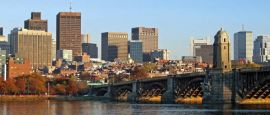Massachusetts History, Language and Culture
History of Massachusetts
Native American tribes were the original inhabitants of Massachusetts until the first European settlement was established by the Pilgrims, who landed at Plymouth aboard the Mayflower in 1620. The Pilgrims, who had emigrated from England to the New World to escape religious persecution, developed friendly relations with the Native American people in the area; it is this friendship which is the basis of the one o the biggest US holidays, Thanksgiving.
The Massachusetts Bay Colony was founded by Puritans, who also fled England looking for religious freedom. The Puritans founded Salem and Boston in the mid-1600s. After many years of land disputes with the Native Americans and the Crown in England, King William and Queen Mary chartered the Province of Massachusetts Bay in 1691, which included the former Massachusetts Bay Colony, Maine, and Nova Scotia.
Massachusetts became the centre for the growing group of patriots in the colonies who wanted freedom from England. Boston was the epicentre for revolutionaries, with iconic leaders like John and Samuel Adams leading the charge. It was also the site of the historic Boston Tea Party in 1773, when colonists protesting the Tea Act unloaded all of the tea from an East India Company ship which had docked at the Boston Harbour.
After the colonies won independence, Massachusetts wrote a state constitution banning slavery and eliminating religious requirements for local office. The most liberal of the states, Massachusetts also became an industrial leader in the mid-19th century, with textile, paper, and tool factories cropping up around the state’s urban centres of Boston and Springfield.
As the railways continued to improve after the Civil War, Massachusetts continued to be a leader of industry; Springfield was a major automobile centre and had the largest public transportation system in the country by 1905.
The state suffered widespread unemployment during the era of the Great Depression and the state-wide factory system collapsed. After WWI, the economy picked back up and after WWII, Massachusetts was again a leader, but this time in technology as home to research facilities and defence contractors.
Today, Massachusetts, and especially Boston, is a leader in the technology industry. Home to Massachusetts Institute of Technology (MIT) and Harvard University, the brightest young minds in the US flock to Boston to research and develop new technologies.
Massachusetts Culture
The majority of Massachusetts’s population is Catholic, due to large-scale immigration of Irish immigrants in the mid-1800s; a large portion of these immigrants and their descendants still reside in the Boston area. Protestant denominations make up the next largest group, including Presbyterian and Episcopalian groups. Massachusetts is also home to smaller groups of Jewish and Muslim populations.




 You know where
You know where